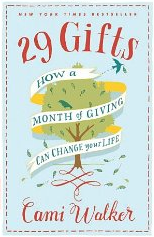This is part 3 in the series on
The Importance of Passion, Purpose and Authenticity in Your Pitch
 Almost two years ago heard Kathryn McHugh, former executive editor at Da Capo Press Lifelong Books, a member of the Perseus Books Group, in New York City, talk about how purpose, passion and authenticity can turn into publishable products. McHugh took on a particular project, 29 Gifts: How a Month of Giving Can Change Your Life by Cami Walker, and she did so in large part because she saw passion and purpose in Walker’s presentation—and in Walker herself. Walker was inspired, and after listening to her pitch at the 2008 Writing For Change Conference in San Francisco, McHugh got inspired as well.
Almost two years ago heard Kathryn McHugh, former executive editor at Da Capo Press Lifelong Books, a member of the Perseus Books Group, in New York City, talk about how purpose, passion and authenticity can turn into publishable products. McHugh took on a particular project, 29 Gifts: How a Month of Giving Can Change Your Life by Cami Walker, and she did so in large part because she saw passion and purpose in Walker’s presentation—and in Walker herself. Walker was inspired, and after listening to her pitch at the 2008 Writing For Change Conference in San Francisco, McHugh got inspired as well.
I decided to ask her for more information on how she got involved in the project and how it became a book–and how writer’s could follow in Cami’s footsteps. This is the third part of that interview. You can read part one here and part two here.
NA: What else can you tell me bout authors that have had passion, purpose or authenticity?
Time and again you’ll find these elements in publishing success stories because it takes a lot of genuine effort to make a book work these days. You have to ask yourself if you are living your book. Does your book match who you are? Successful authors live their books and in a sense, are their books.
NA: What encouragement would you offer nonfiction authors who are passionate and have a purpose but who feel they are struggling to get a book published traditionally?
KM: It’s important if you are feeling like you are hitting a wall getting your book published to pin point what area needs improvement. Get feedback from the agents and editors you are pitching. Is it the idea for the project that isn’t solid? Is there something about it that isn’t appealing? Are there are too many books in the category and they don’t see a way for you to break through, or is it that your platform isn’t quite at a national-ready level? Is it simply a matter of the pitch not being strong enough? Maybe you have a great idea but it’s not being conveyed in way that is strong enough. Determine how you can improve. Get feedback from a professional or a friend who you trust to give you an honest opinion.
With that said, you also have to believe in your idea. On the other end of the spectrum are people who lack so much confidence in their ideas that they ask, “Should I change it to this or that? Should I make it this or that?” At the core you have to have a message you want to get out.
NA: And is traditional publishing, or are the Big Six houses, for everyone with passion and purpose and authenticity?
KM: Not necessarily. You could have a great idea and something to say, but may be that audience is limited. Maybe this is not a topic for hundreds of thousands of people. Maybe the audience is more of a niche. Maybe an alternative publishing area is better. Maybe you are not going for Random House but for a university press or for self-publishing. It depends what community you are targeting. Think beyond the big six houses, there are many publishers out there that publish in many areas imaginable.
NA: In conclusion, what would you like nonfiction writers to know?
KM: If you want to get published, you need to believe in your book and keep trying. The world needs books. We need authors.